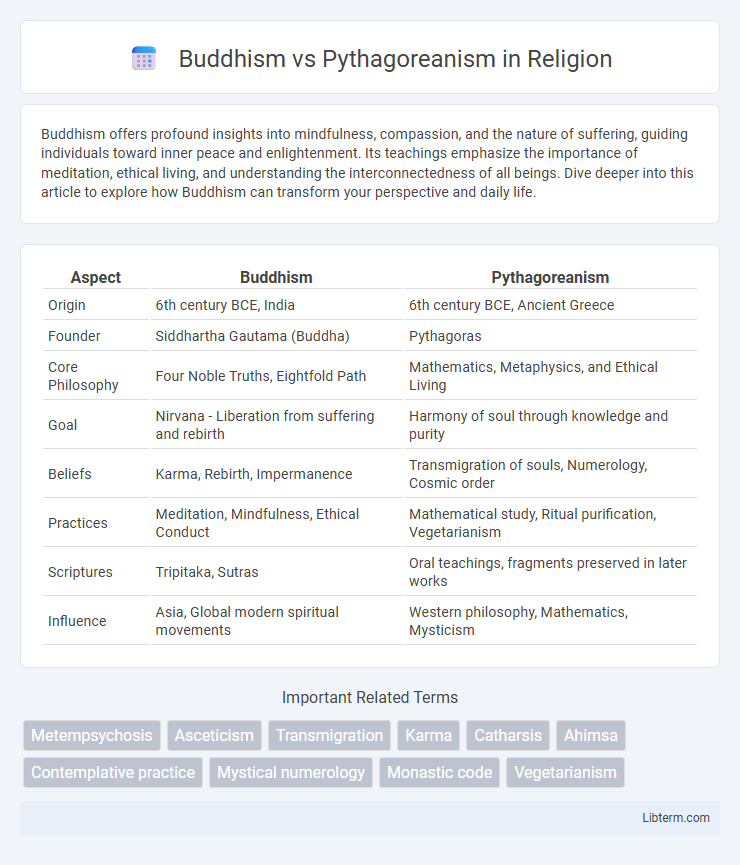Buddhism offers profound insights into mindfulness, compassion, and the nature of suffering, guiding individuals toward inner peace and enlightenment. Its teachings emphasize the importance of meditation, ethical living, and understanding the interconnectedness of all beings. Dive deeper into this article to explore how Buddhism can transform your perspective and daily life.
Table of Comparison
| Aspect | Buddhism | Pythagoreanism |
|---|---|---|
| Origin | 6th century BCE, India | 6th century BCE, Ancient Greece |
| Founder | Siddhartha Gautama (Buddha) | Pythagoras |
| Core Philosophy | Four Noble Truths, Eightfold Path | Mathematics, Metaphysics, and Ethical Living |
| Goal | Nirvana - Liberation from suffering and rebirth | Harmony of soul through knowledge and purity |
| Beliefs | Karma, Rebirth, Impermanence | Transmigration of souls, Numerology, Cosmic order |
| Practices | Meditation, Mindfulness, Ethical Conduct | Mathematical study, Ritual purification, Vegetarianism |
| Scriptures | Tripitaka, Sutras | Oral teachings, fragments preserved in later works |
| Influence | Asia, Global modern spiritual movements | Western philosophy, Mathematics, Mysticism |
Introduction to Buddhism and Pythagoreanism
Buddhism, founded by Siddhartha Gautama in the 5th century BCE, emphasizes the Four Noble Truths and the Eightfold Path as a means to achieve enlightenment and liberation from suffering. Pythagoreanism, attributed to Pythagoras in the 6th century BCE, centers on the belief in the fundamental role of numbers and mathematical harmony in understanding the cosmos and human existence. Both systems integrate philosophical teachings with ethical practices, yet Buddhism focuses on spiritual awakening while Pythagoreanism merges mysticism with numerical science.
Historical Origins and Development
Buddhism originated in the 6th century BCE in India, founded by Siddhartha Gautama, the Buddha, emphasizing the Four Noble Truths and the Eightfold Path to alleviate suffering. Pythagoreanism emerged in the 6th century BCE in ancient Greece, established by Pythagoras, focusing on mathematics, harmony, and the belief in the transmigration of souls. Both traditions developed distinctive philosophical frameworks that influenced spiritual and scientific thought in their respective cultures and beyond.
Founders: Buddha vs. Pythagoras
Buddhism, founded by Siddhartha Gautama (the Buddha) in the 5th century BCE, centers on the Four Noble Truths and the Eightfold Path as a guide to enlightenment and liberation from suffering. Pythagoreanism, established by Pythagoras in the 6th century BCE, combines mathematical philosophy with religious teachings, emphasizing the significance of numbers and harmony in the cosmos. Both founders influenced distinct spiritual and philosophical traditions, with Buddha focusing on ethical practice and mental discipline, while Pythagoras integrated metaphysics, mathematics, and mysticism.
Core Philosophical Teachings
Buddhism centers on the Four Noble Truths and the Eightfold Path, emphasizing the cessation of suffering through detachment and mindfulness. Pythagoreanism revolves around the belief that reality is fundamentally mathematical, highlighting harmony, numerical relationships, and the immortality of the soul. Both philosophies advocate for self-realization and ethical living but diverge in metaphysical focus--Buddhism on impermanence and non-self, Pythagoreanism on abstract mathematical order and reincarnation.
Concepts of the Soul and Reincarnation
Buddhism teaches the concept of anatta, or non-self, rejecting a permanent soul and emphasizing the cycle of rebirth driven by karma until achieving Nirvana. Pythagoreanism asserts the immortality of the soul, viewing it as an eternal, indivisible essence that transmigrates through different bodies to achieve purification. Both systems engage with reincarnation but diverge fundamentally on the nature of the soul's permanence and identity.
Ethics and Moral Codes
Buddhism emphasizes the Eightfold Path as a practical guide to ethical living, focusing on right speech, right action, and right livelihood to reduce suffering and cultivate compassion. Pythagoreanism centers on moral purity through principles like justice, temperance, and harmony, advocating for a disciplined lifestyle to achieve spiritual and mathematical order. Both philosophies promote self-restraint and ethical conduct but differ in their ultimate aims: personal enlightenment in Buddhism and cosmic harmony in Pythagoreanism.
Practices and Daily Rituals
Buddhism emphasizes daily meditation, mindfulness, and ethical precepts such as non-harming and compassion, often incorporating chanting and offerings at shrines to cultivate spiritual awareness. Pythagoreanism centers around mathematical contemplation, dietary restrictions like vegetarianism, and ritual purification practices aimed at achieving harmony and spiritual purification. Both traditions integrate disciplined routines that foster inner balance, yet Buddhism focuses more on mental liberation while Pythagoreanism links spiritual progress with numerical and cosmic order.
Approach to Mathematics and Metaphysics
Buddhism approaches mathematics as a practical tool for understanding impermanence and the nature of reality, emphasizing experiential insight rather than abstract theorization. Pythagoreanism treats mathematics as a fundamental principle underlying the cosmos, viewing numerical relationships as the essence of metaphysical truth and universal harmony. While Buddhism centers on the transcendent insight beyond concepts, Pythagoreanism elevates numbers to a sacred, metaphysical status governing existence.
Influence on Later Philosophies and Religions
Buddhism significantly influenced later philosophies and religions through its teachings on impermanence, suffering, and the path to enlightenment, shaping Eastern traditions such as Taoism and Zen Buddhism. Pythagoreanism contributed to Western thought by integrating mathematics, mysticism, and the concept of an orderly cosmos, impacting Platonism, Neoplatonism, and early Christian theology. Both systems fostered ideas about harmony and the nature of reality, leaving lasting legacies on metaphysical and ethical frameworks across diverse cultures.
Comparative Analysis: Similarities and Differences
Buddhism and Pythagoreanism both emphasize the pursuit of spiritual knowledge and ethical living, with Buddhism focusing on the Four Noble Truths and the Eightfold Path, while Pythagoreanism centers on mathematical harmony and metaphysical principles like the transmigration of souls. Both traditions advocate for self-discipline and purification of the soul, yet Buddhism stresses liberation from suffering through mindfulness and enlightenment, whereas Pythagoreanism highlights the cosmic order and the immortality of the soul achieved through philosophical study. The key difference lies in Buddhism's practical approach to ending suffering in this life versus Pythagoreanism's abstract emphasis on mathematical and metaphysical harmony as the path to soul purification.
Buddhism Infographic

 libterm.com
libterm.com